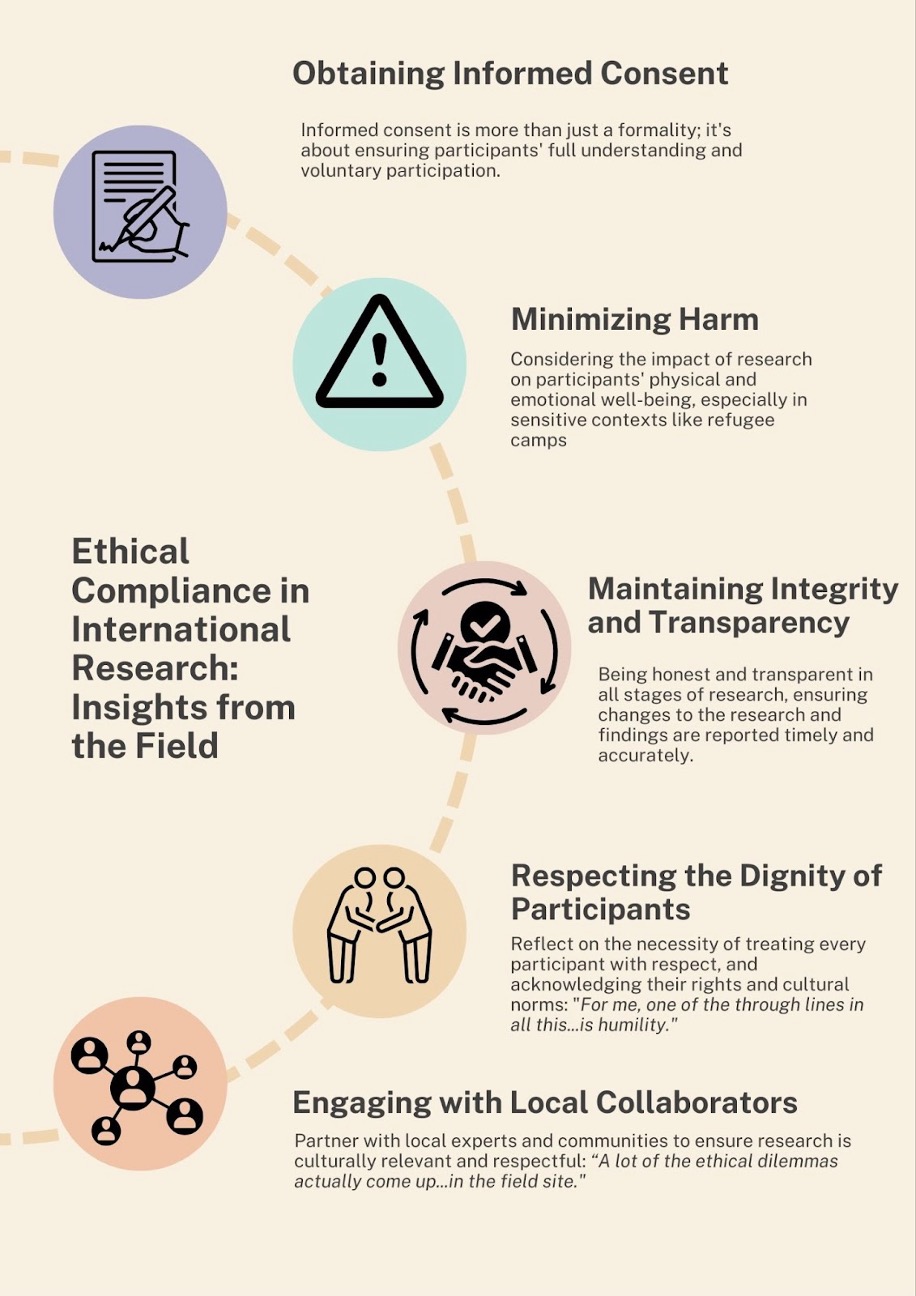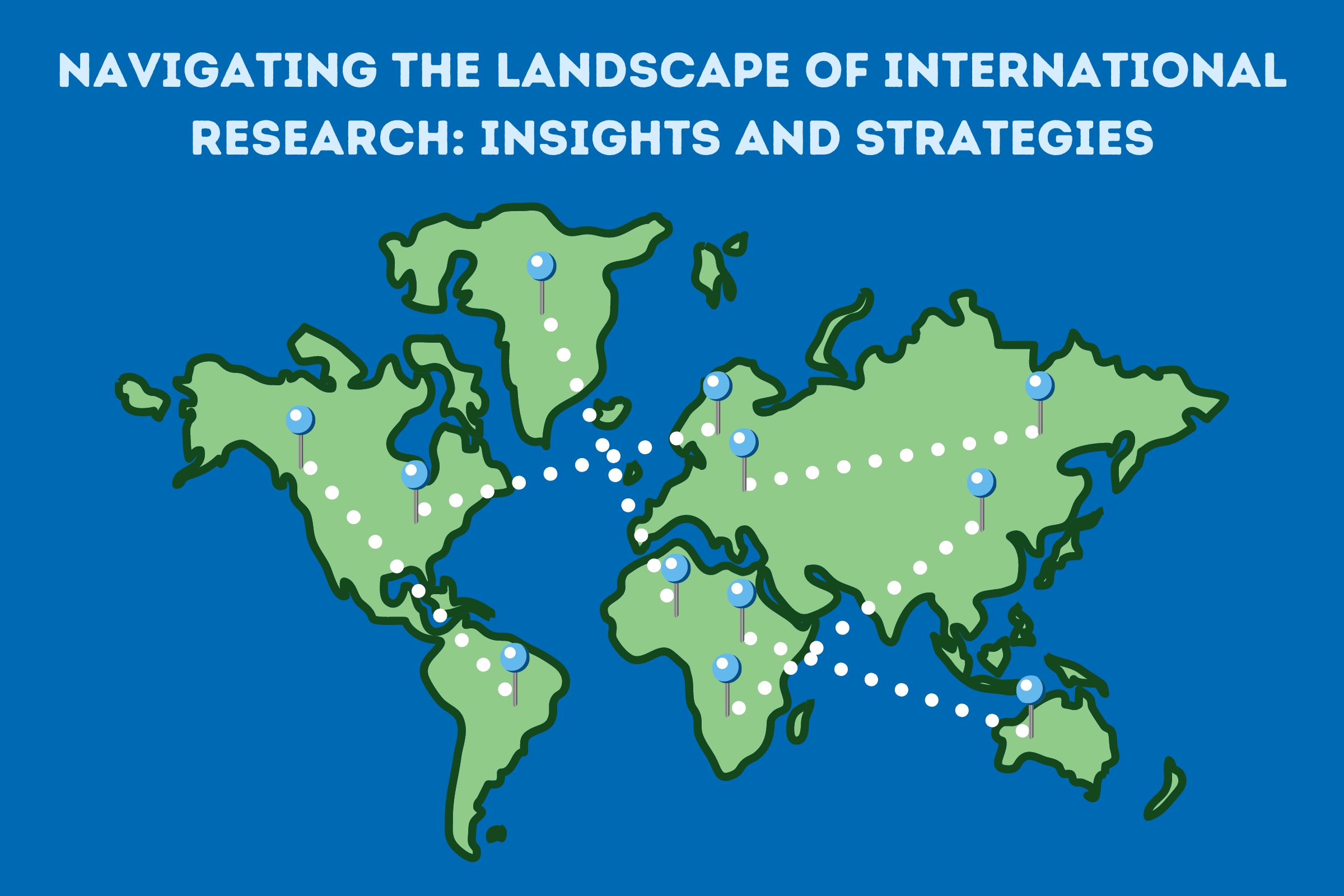International research in education presents a dynamic and challenging landscape that demands a rigorous academic approach and deep ethical and cultural sensitivity. During a recent panel discussion on Mar 28th, international and comparative education experts shared their insights, emphasizing the nature, importance, opportunities, and challenges of conducting research across borders.
Featured Panelists
- Dr. Mary Mendehall, Ed.D.: Associate Professor of International and Comparative Education
- Amine Mechaal: Director of Global Engagement, Office of Global Engagement
- Samaya Mansour: Doctoral Student for International & Comparative Education, Research Fellow for the Division of Academic Planning and Global Affairs
The Essence of International Research
At its core, international research is pivotal for understanding diverse educational processes and experiences. As one panelist noted, "International research is exceptional in understanding diverse processes and experiences." This type of research often involves comparing and contrasting educational systems, policies, and practices across different countries, offering a unique lens through which we can learn and implement global best practices.
Ethical Considerations and Cultural Competence
A significant portion of the discussion focused on the ethical considerations intrinsic to international research. The panel highlighted the importance of balancing risks and benefits, ensuring that research contributes positively to the communities involved. "Ethical questions and issues...force us to balance risk and inconvenience in the interest of advancing knowledge designed to benefit individuals and society," a panelist remarked, underscoring the ethical dilemmas researchers often face.
Cultural competence, loosely defined as the ability to understand, appreciate, and interact with people from cultures or belief systems different from one's own, emerged as another critical theme. One panelist shared, "Cultural competence and humility are...essential...navigating those spaces about what's different, what's the same, and never forgetting the shared humanity that bridges those areas." This sentiment reflects the necessity of engaging deeply with local communities and understanding the cultural context in which research takes place.
Opportunities and Challenges
The dual nature of opportunities and challenges in international research was another focal point. Opportunities for learning from different contexts are immense, yet they come with their own set of challenges, such as navigating different cultural norms and ethical landscapes. Reflecting on this, a panelist stated, "The opportunities are huge...the challenges...depend on where we're going and how that aligns with our own identities and profiles."
Global Collaborations and Partnerships
The importance of building equitable partnerships with local researchers and communities was underscored as a foundation for successful international research. Effective collaborations are based on mutual understanding, respect, and shared goals. "Successful international research collaborations...rely on mutual understanding, respect, and aligning with partners' goals and objectives," shared a panelist, highlighting the essential elements of productive international research partnerships.
Conclusion
International research in education is a rich field that offers vast opportunities for learning and growth. However, it requires a nuanced understanding of ethical considerations, cultural competence, and the importance of building strong, equitable partnerships. As researchers navigate this complex landscape, the insights shared by the panelists serve as a valuable guide for conducting research that is not only academically rigorous but also ethically sound and culturally sensitive.
Reflections
As we reflect on the insights shared by our esteemed panelists, several thought-provoking queries emerge, inviting us to delve deeper into the essence of our work and its implications.
How do we, as researchers, ensure that our endeavors truly serve the communities we study, transcending the realm of academic achievement to foster real-world benefits? The specter of colonial dynamics looms large over international research; recognizing this, we must ask ourselves about the concrete steps we can take to avoid perpetuating such imbalances and instead, pave the way for truly equitable collaborations.
The pursuit of cultural competence raises its own set of dilemmas. Is it possible for an outsider to fully grasp the cultural intricacies of a community different from their own, or does this inherent limitation skew the lens through which we view our findings? Furthermore, in our efforts to embrace cultural diversity, how do we navigate the delicate balance between appreciation and appropriation, ensuring our research respects the very cultures it seeks to understand?
Equity in partnership stands as a pillar of ethical international research. Yet, the reality of power and resource disparities poses a significant challenge. What defines a fair and balanced partnership when the scales are so unevenly tipped? And in the broader landscape of academic discourse, how can we amplify the voices from the Global South, ensuring their perspectives are not just heard but heeded?
The impact of our research extends beyond the academic community, often influencing policy and practice. This leads us to question the researcher's role in the practical application of their findings and the metrics by which we gauge the true impact of our work on societal advancement.
Looking forward, as we embrace the digital age, new ethical considerations come to the fore, particularly regarding data privacy and consent. How can we adapt our methodologies to respect these boundaries while continuing to push the envelope of knowledge?
As we conclude, these questions hang in the balance, unresolved but undeniably critical. They compel us to look inward, reevaluate our practices, and engage in a dialogue that is as challenging as it is necessary. In sharing these reflections, we invite you to join us in this ongoing conversation, to explore these complexities, and to contribute to a future where international research not only broadens our understanding but does so with integrity, respect, and a genuine commitment to global betterment.
Infographic: A Visual Guide to International Research
We've created an infographic that captures the essence of our panel discussion, offering a visual representation of the key themes and considerations involved in conducting international research:

